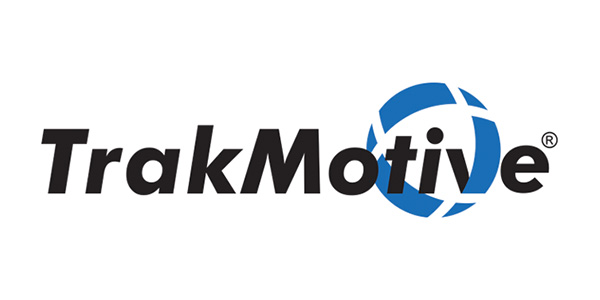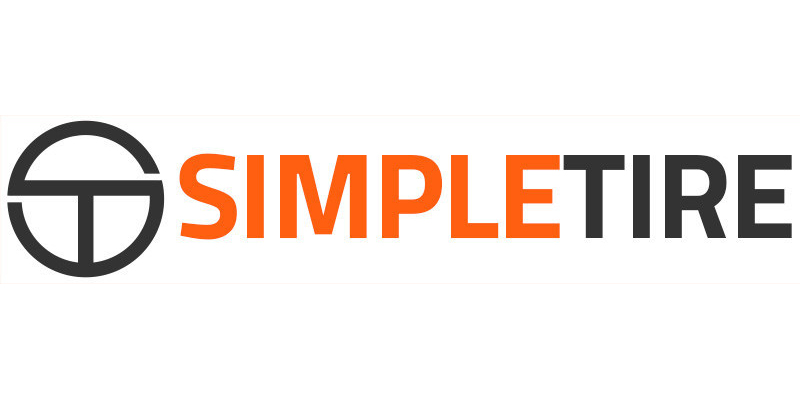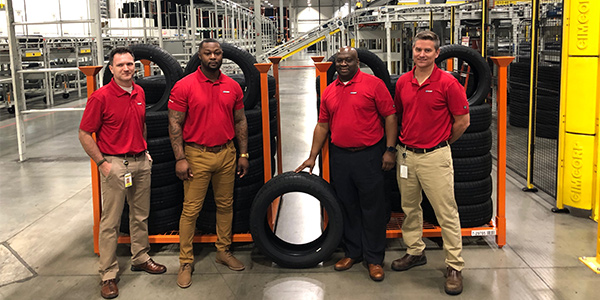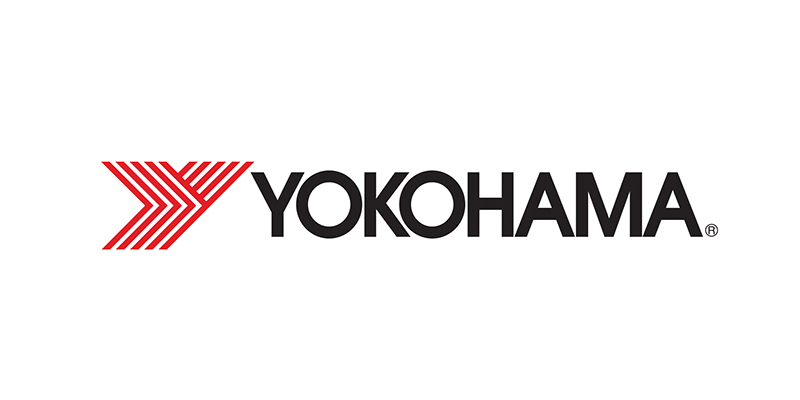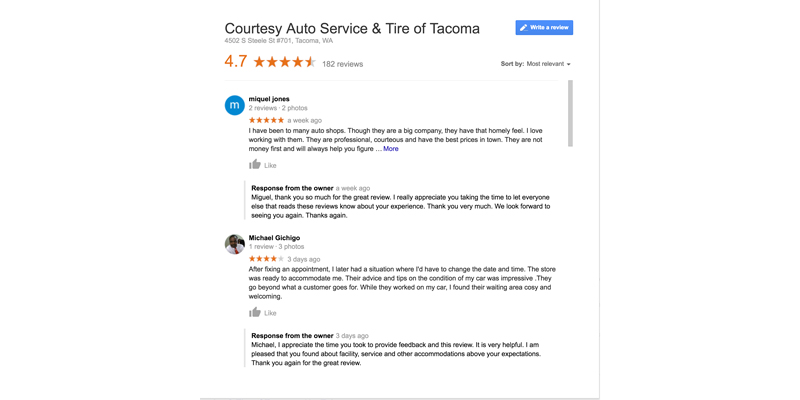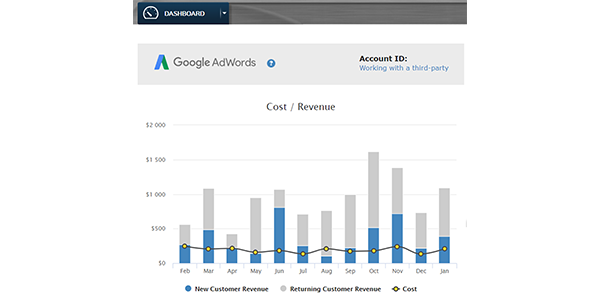Question: “Where do you hide a dead body?” Answer: “On the second page of Google.”
Only 10% of people go on to the second page of Google. Because of this, the temptation to cheat to get on page 1 is significant.
Google does not like people to cheat. Its punishment, short of banning you, is to “down-list” your company. Getting down-listed is real punishment. It means that Google will take your natural placement and push you down several spots depending on the infractions.
In a service-oriented business like a tire dealership, showing up well in search results is absolutely critical, so you don’t want to mess with Google.
There are various reasons why Google will ban or down-list your website.
The term “Black Hat” comes from old cowboy movies where you could always tell the “bad guys” apart from the white-hatted “good guys” because they wore black hats. Black hat strategies refer to actions where the illegality of the activity is clearly known to all who participate. White hat strategies mean playing by the rules.
And, while few cowboys wore gray hats, that term applies to actions that are considered “iffy,” but unclear where they fall. Google sniffs around for these activities, too.
Black hat in search engine jargon is the use of aggressive SEO strategies, techniques and tactics that focus only on search engines and not a human audience, and usually do not obey search engine guidelines.
Practices that Backfire
There are a few things that will surely get you nailed by Google. They are listed here, not to tempt you to break rules, but to warn you about letting those who would “help” you get better SEO results by leading you to cheat.
1. Have no backlinks. The World Wide Web is a large network of computers and websites that are linked with each other in one or more ways. If your website does not have any links pointing to it, search engines may decide that your site is not legitimate. It is relatively simple to obtain relevant and high quality backlinks for your website. The easiest way is to publish an article on someone else’s website or blog with a link back to your site. Always avoid offers to buy backlinks from any outside source. If you could find the source, you know Google already has. It is the kiss of death.
2. Rapid backlink growth. You don’t want to obtain too many backlinks in a short period of time, particularly if your website is new. Getting dozens or hundreds of backlinks in a short period of time is not considered “natural growth” to Google. Grow your backlinks in a gradual and constant manner to avoid suspicion. Further, focus only on backlinks that are from relevant and high-quality websites.
3. Have bogus links. If your website is related to medical or health, the websites to which you are linked should be related to your website’s core purpose. If a website is related to medical and it is linked with a website that talks about auto service, you will lose credibility with Google and be downgraded in the rankings. Other obvious bogus links are from sites that don’t have a domain from your own country, or sites that include the characters “SEO” or “LINK” in their URL, or if the domain looks odd (made up of letter/number combinations, for example).
4. Use a cloaking strategy. Cloaking is a technique where you include information within your Web page that can’t be seen by viewers, but is intended to influence the search engine robots. It used to work to hide words in the framework of a Web page that was rendered in white text against a white background.
5. Use spoofing. Spoofing is a technique where you adjust your meta tags and other page elements to make the search engine think the page or site is about one subject, when it really is about something else. Transparency online is respected and valued. Google’s algorithms are built to ferret out tricks and punish the tricksters.
6. Website mechanical issues. If your website has technical issues and a search engine’s robots can’t index it, they might consider the site as an unreliable source and delist it. This can take the form of broken internal links or images that do not load properly. Whoever is responsible for your website can fix these things easily.
7. Keyword stuffing. Since the basis for Google searching is the use of keywords, it is important to use these keywords in the text of your website, particularly header tags, headlines and text at the top of your site. Some people make the mistake of overdoing it. In the past, sites could rank on a large variety of keywords by simply cluttering them onto a page, even if the keywords were unrelated and the site was absent of any real content. Some people hid this fact by using a cloaking technique (see above), but Google now actually calculates the percentage of the text that uses your keywords.
8. Ignore search engine guidelines. Almost all search engines provide reference guides for how to adhere to their guidelines. For example, Google has its own application called Google Webmaster Tools. This is a free application. To find it, look up terms such as “Google Guidelines” and “Your website performance against Google standards.”
9. Use doorway pages. This strategy means using a different home page for different types of users or using two different versions of the same Web page with one for search engine robots and another for users. Google sniffs out duplications and punishes those who try to trick its algorithms.
10. Use duplicate content. Do not use copy from another online source word-for-word. If you like the message, rewrite it in your own words. (You should not use copy from offline sources either; that is called plagiarism.) And, once you have your unique version of the copy on your website, do not duplicate it on other pages within your site, either. There is a free tool to find the amount of duplicate content on your website pages at siteliner.com.
11. Use a blacklisted host. Frankly, it would be very unusual for you to find a host that is blacklisted these days, when services such as GoDaddy, HostGator or Bluehost are so readily available. Nevertheless, sometimes people get help with their website from those who “have a friend in the business” and take you to places you don’t want to be.
12. Astroturfing. The term “astroturfing” applies to companies that create fake comments online that improve their image to readers. Google, Yelp and most other review sites have built-in systems to catch fake reviews and have their own systems of punishment.
Inexpensive Experts
The unfortunate fact is that it would be the rare tire dealer who would purposefully do any of the “12 Google Sins” described above. What happens, however, is that “the son of your best customer” or “wife’s nephew” or other such “expert” enters the scene and “won’t charge much to manage your website.”
Because the distance between automotive knowledge and Internet knowledge is generally substantial, innocent people can get hurt. By knowing such tricks exist, you can arm yourself against such helpful people by knowing a few of the right questions to ask.
Roger McManus, author of Entrepreneurial Insanity in the Tire Industry (www.TheTireBusiness.biz), is a principal at a digital marketing company that helps dealers with their online efforts. He will appear in the upcoming documentary about Yelp, “The Billion Dollar Bully” (early 2016), and his upcoming book Inverse Marketing deals with the ever-changing world of the Internet and its impact on small business. Roger can be contacted at [email protected].




